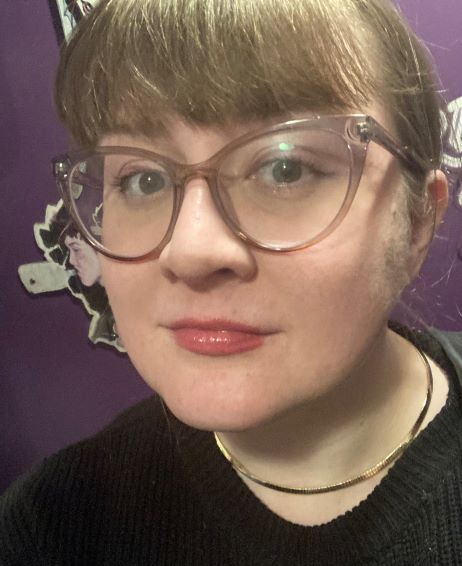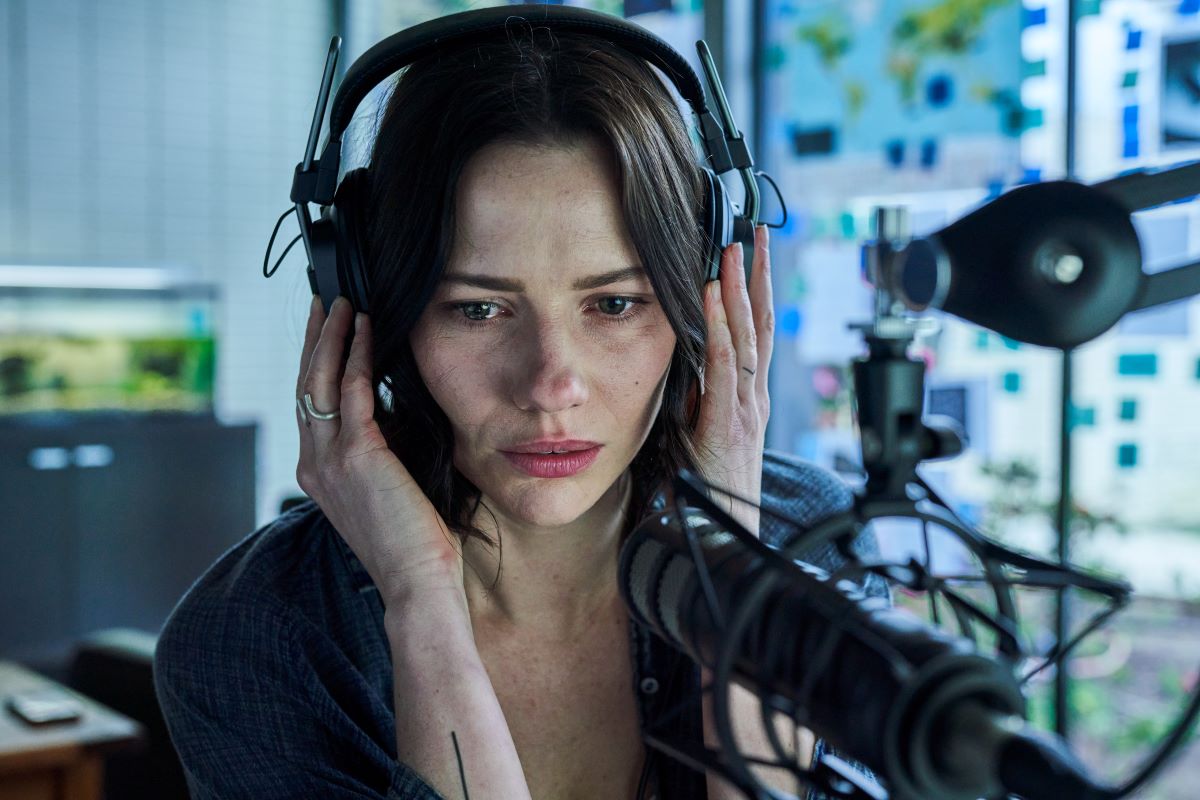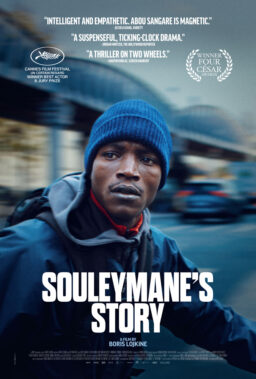Even as they become endangered in real life, radio DJs are a tenacious presence in the movies. Just last year, “John Wick: Chapter 4” paid tribute to “The Warriors” with a nearly shot-for-shot recreation of the sultry-voiced DJ who told all the boppers to listen up in Walter Hill’s 1979 film.
It was a nostalgic nod, not only to the movie, but to the idea of a communal culture that no longer exists. You simply won’t walk down a street and hear every house tuned in to the same radio station anymore. What we have instead are people wearing earbuds, each in their own little world, probably piping in a podcast.
Despite being around for nearly two decades with increasing cultural dominance, podcasters are a relatively rare presence in the movies. In sci-fi blockbusters, they can be conduits for wonder—a character in “Ghostbusters: Afterlife” is literally named Podcast—whose underdog status lends them a certain counterintuitive credibility. (See also: Brian Tyree Henry’s conspiratorial podcast host in 2022’s “Godzilla Vs. Kong.”) They can also lend quaint texture to an independent drama like “C’mon C’mon,” in which Joaquin Phoenix plays an NPR-style “radio journalist.”
But it’s in horror movies, the place where we go to collectively digest our subconscious hatreds and fears, where you can see how we, as a culture, feel about podcasts and everything they stand for: the collapse of traditional media, the rise of influencers and parasocial fame, misinformation, the attention economy, and the unnatural, brain-breaking din of hearing what everyone has to say about everything all of the time. And how do we feel? We hate it and we want it to die.
As with their content-obsessed cousins, livestreamers (quite negatively portrayed in “Deadstream” and “Dashcam”), if you’re watching a horror movie and someone is introduced as a podcaster, this is a character whose death you’re about to relish. At best, podcasters in horror movies are self-absorbed and gullible. At worst, they’re cancerous presences who stand in for a director’s hatred of their critics. The rise of podcasts happened in tandem with the rise of social media, which made it easier than ever for trolls to talk trash about famous filmmakers. And a podcaster, at least in the movies, is basically a professional troll.

The meanest of them all is in “Tusk,” Kevin Smith’s 2014 pivot into horror and the ur-text for this niche subcategory of horror films. The irony here is that Smith is himself a podcaster, and hosts an astonishing seven shows at the time of this writing. The film is based on an episode of Smith’s podcast “SModcast,” which was itself based on an online ad offering free room and board to anyone willing to dress up like a walrus for two hours a day. That ad turned out to be a hoax, but now we have a movie based on it, which is just kind of how the internet works.
Justin Long’s character in the film, podcast host Wallace Bryton, does even less fact-checking. Calling what he and his co-host Teddy (Haley Joel Osment) do “journalism”—basically, they retraumatize viral stars by interviewing/mocking them about their 15 minutes of infamy—is a real stretch. Called “The Not-See Party,” complete with obnoxious fake German accents in the outro, their show is the smug, snarky epitome of the worst excesses of millennial alpha nerds, observed from the point of view of a Gen X alpha nerd. (Say what you will about Smith’s style, but you can never accuse him of taking himself too seriously.)
Name a negative character trait, and Wallace probably has it. He’s an obnoxious, entitled, misogynistic liar—which means that, in the style of Smith’s contemporary Eli Roth, it’s okay to enjoy every anatomically implausible torture he’s about to suffer when he cuts yet another corner and ends up in the clutches of madman Howard Howe, played by Michael Parks. Despite the grotesque touches and seething hatred of its main character, however, much of Smith’s movie is a silly comedy. The hatred David Gordon Green has for the podcaster characters in his 2018 version of “Halloween,” meanwhile, is deadly serious.
Even in this overall quite brutal movie, the savagery of the deaths stands out. Aaron Korey (Jefferson Hall) and Dana Haines (Rhian Rees) are more professional than Wallace and Teddy—their show reads more “Serial” than it does guys in graphic tees farting into microphones. They’re also insensitive and selfish, but in a way that suggests they take themselves seriously; when they taunt Michael Myers or press Laurie Strode (Jamie Lee Curtis) for details about her ordeal, they’re “doing it for the story.” Still, their callousness makes them two more justified deaths, dispatched by Michael early on in the film in an intensely violent scene in a filthy gas station bathroom.

Aaron and Dana’s self-aggrandizing smugness is a symptom of “true crime brain,” something that’s not unique to podcasters but which developed a particularly virulent strain during a boom in true crime podcasts in the late 2010s. “True crime brain” makes a person hypervigilant about potential threats to the self, yet callous about actual violence towards others; the condition is accurately diagnosed in the under-the-radar 2015 indie TV show “Women Who Kill,” in which producing the podcast of the same name poisons the brains of exes Morgan (Ingrid Jungermann) and Jean (Ann Carr) until they see serial killers everywhere they look. The podcast fades into the background as the film goes on, but an early scene where the hosts talk shop with a convicted serial killer is withering in its critique.
And while the actual content of said podcast is amusingly unclear, “podcaster” is also code for “terrible person” in “Bodies Bodies Bodies” (2022), Halina Reijn’s self-conscious Gen Z slasher about a group of rich kids (and one working-class misfit) who turn on each other when a party game goes horrifically wrong. In the film, Rachel Sennott’s character, Alice, is a superficial, self-centered, faux-progressive podcaster whose ego—she cannot tolerate the accusation that one of her friends “hate-listens” to her podcast, and starts an argument that turns violent—directly leads to her demise. Although, to be fair, she’s not any worse than her onscreen friends.
Gary (Ethan Suplee) in “The Hunt” (2020) is Alice’s mirror image, an equal and opposite right-wing idiot whose wounded ego explodes into violence with remarkable speed. Compared to that of the podcaster characters in “Halloween,” Gary’s death isn’t stretched out for the audience’s pleasure—part of the film’s overall contrarian raison d’etre. But he, and to an extent Alice, reflect the echo chamber of partisan politics in 21st-century America—a divide fueled, in part, by social media and podcasts—as well as skepticism of the credentials of a new type of media figure.

“Monolith” (2023) also plays with the tension between podcasts and more traditional forms of media, forcing its protagonist, a disgraced journalist played by Lily Sullivan, to “lower” herself by working on a paranormal podcast after losing her job at a newspaper. “The Interviewer,” as she’s called in the script, is disdainful of her new medium at first, seeing it as ridiculous and beneath her. But she gets sucked into it nonetheless, which is not only a commentary on the seductive power of likes and shares—the podcast takes off as the film’s mystery deepens, and the two forces fuel each other—but also a tacit defense of the integrity of podcasts themselves.
“The Interviewer” is not an unlikeable protagonist because she’s working on a podcast. In fact, there are some rather lovely scenes in this chamber piece thriller that show visually how a podcast is constructed. She and her lack of integrity leading into the project are the problem, making her an unreliable narrator as she takes on a private-eye type of role investigating the mystery of the “black bricks” that have been randomly appearing on doorsteps across the globe. The film doesn’t hate its lead simply for being a podcaster, but for sneering at podcasting while also being bad at it.
Nearly ten years into surveying horror movies with podcasters as characters, we finally find one that isn’t hostile towards podcasts in general. Perhaps we’re finally starting to get used to them; in a milestone of normalization, Lifetime now has two original films, “The Podcast Murders” and “A Podcast to Die For,” whose heroines are true crime podcasters. Going from repellant to plug-and-play aspirational within a decade? Not so bad! The influencers, on the other hand, still have a way to go.












